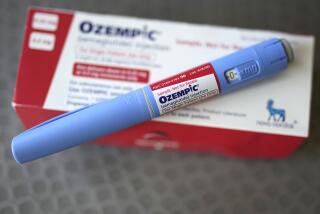Dennis Quaid files suit over drug mishap
- Share via
Actor Dennis Quaid and wife Kimberly sued a leading blood-thinner manufacturer Tuesday, saying the labeling and design of the product led to a massive overdose of their newborn twins last month at Cedars-Sinai Medical Center.
The Quaids’ babies, Thomas Boone and Zoe Grace, twice were given 1,000 times the intended dosage of heparin on Nov. 18 at the Los Angeles hospital.
At 11:30 a.m. and again at 5:30 p.m., nurses mistakenly administered heparin with a concentration of 10,000 units per milliliter instead of 10 units per milliliter, the family’s attorney said. Another child also was given the wrong dose of the medication, often used as a flush to prevent blood clots around intravenous catheter sites.
All three children have since been released from the hospital, which said they suffered no adverse health effects.
Detailing the incidents for the first time Tuesday, Cedars-Sinai cited at least three separate safety lapses that led to the overdoses.
In a prepared statement, the hospital said a pharmacy technician took the heparin from the pharmacy’s supply without having a second technician verify the drug’s concentration, as hospital policy requires. Then, when the heparin was delivered to a satellite pharmacy that serves the pediatrics unit, a different technician there did not verify the concentration, as required.
Finally, the nurses who administered the heparin to the patients violated policy by neglecting to verify that it was the correct medication and dose beforehand, the hospital said.
The staffers involved were relieved of duty during the investigation and “appropriate disciplinary actions are being taken,” the hospital said.
Heparin is one of the most frequently used -- and misused -- drugs in the nation, according to U.S. Pharmacopeia, which operates a medication error and adverse drug reaction reporting program. Between 2001 and 2006, more than 16,000 heparin errors were blamed on incorrect dosing, according to data the group prepared for The Times.
In their suit, which was filed in Cook County Circuit Court in Chicago, the Quaids contend that Baxter Healthcare Corp. knew that other infants had died as a result of similar errors involving heparin yet still did not recall the high-concentration vials. The lawsuit also faults Baxter for using similar background colors on the labels of both the high- and low-concentration vials, despite the possible confusion it would cause.
“The Quaids’ concern right this moment is to bring to the attention of the public this dangerous condition,” said their lawyer, Susan E. Loggans. “They don’t want to see another family go through what they did.”
Baxter, which is based in Deerfield, Ill., would not comment on the suit because it had not been served. But spokeswoman Erin Gardiner said, “This is not a product issue. The issue here is about improper use of a product.”
Last year, three babies in Indiana died after a heparin overdose nearly identical to that at Cedars-Sinai. Months later, Baxter issued a warning, citing “the potential for life-threatening medication errors involving two heparin products.”
In October, Baxter altered the label on high-concentration heparin vials, changing the background color, increasing the font size and adding a “red alert” tear-off label, Gardiner said. Cedars-Sinai was still using the old vials when its errors occurred last month.
Baxter is one of several companies that make heparin. Given the confusion over the similar heparin vials, the drugs probably should have been recalled, said Kasey Thompson, director of the patient safety and quality division at the American Society of Health-System Pharmacists.
The drug error involving the Quaid twins was identified after one of the babies started to seep blood from a puncture site. Through blood tests, Cedars-Sinai staff found that three had been given excessive doses of heparin, officials said.
The Quaid twins, originally at the hospital for treatment of an infection, were given the drug protamine sulfate to reverse the effects of heparin and restore normal blood-clotting function. Now at home and nearly one month old, Loggans said, “The kids are doing great. I just saw them. They look fantastic.”
Even so, Loggans said she was not aware of any long-term studies examining the effects of heparin overdoses on newborns. “You’re talking about condemning parents to having a lifetime of having this little doubt in their mind,” she said.
The Quaids have not sued Cedars-Sinai. Loggans said they want to see what steps the hospital takes to prevent recurrences.
The hospital already has removed all heparin used for IV flushes from the pediatric unit and will instead use only a saline solution. Additional checks also will be required before medications at high risk for errors are stocked in a patient care unit.
The Quaids declined to comment Tuesday, but spokeswoman Lisa Kasteler said in an e-mail to The Times, “They do want everyone to know they . . . are sincerely thankful for all the concern and good wishes they have received.”
More to Read
The biggest entertainment stories
Get our big stories about Hollywood, film, television, music, arts, culture and more right in your inbox as soon as they publish.
You may occasionally receive promotional content from the Los Angeles Times.










